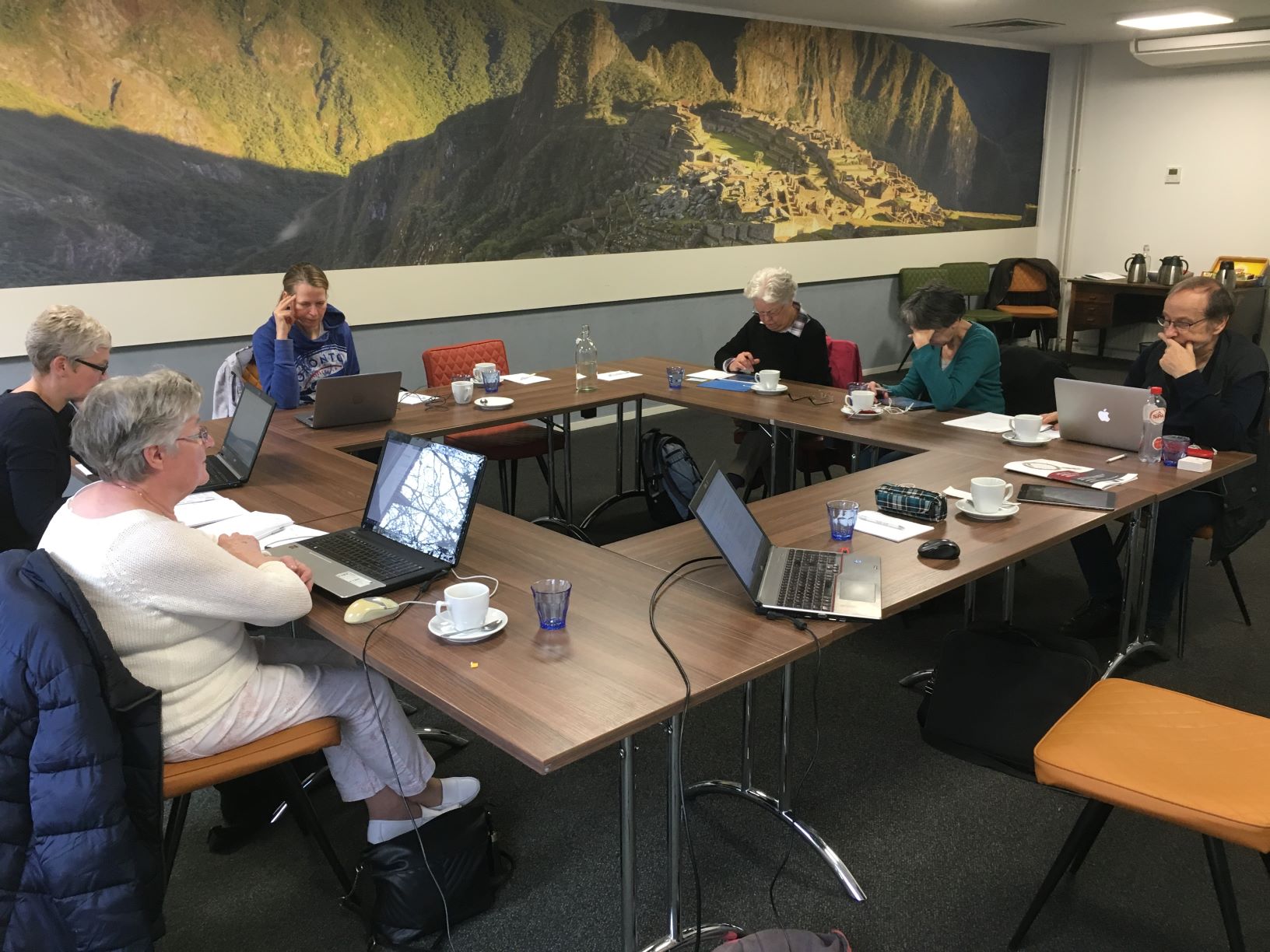
In this new blog series, we will highlight the different Special Interest Groups (SIGs) SENSE has to offer. SIG meetings are open to all members, and guests are welcome to attend one or two meetings before deciding whether they would like to join SENSE. Check the events calendar for upcoming SIG meetings. Contact the SIG convener for more information or to suggest a meeting topic. If you would like to start a new SIG, contact our SIG and Social Events Coordinator. SenseMed convener Curtis Barrett kicks off:
Can you tell us a little about yourself?
I’m an American, born and raised. I moved here in 2007 to continue my career as a neurobiologist, working as a group leader at Leiden University Medical Center (LUMC). In 2011, I left the research world and started my freelance editing and consulting business, helping fellow scientists and clinicians publish their research and obtain grants. In addition, I have a permanent position as a lecturer at Wageningen UR, where I teach scientific writing to MSc and PhD students.
What is SenseMed and who is it for?
SenseMed is a special interest group that focuses on bringing together SENSE members with clients in the medical and biomedical fields. In a nutshell, SenseMed provides a forum where like-minded editors, translators, and medical writers can exchange ideas, discuss the latest trends and challenges in publishing and funding, help de-mystify obscure medical terminology, and more.
How did SenseMed get started?
SenseMed was started by SENSE members Josefien Bruijn, Julie Box and Daphne Lees to connect members with questions related to medical terminology. For years, SenseMed was strictly email-based, with members joining a Yahoo! mailing list to exchange questions and answers. With the growing ease and power of search engines, however, participation in the mailing list declined, so last year we closed the mailing list and now encourage members to post their queries on the members-only Forum.
How often does SenseMed meet up?
That’s a good question! Actually, with the exception of one event about six years ago, SenseMed has never met at a physical location, and that’s something we’re hoping to change. Our goal is to organize two to three meetings each year.
How many people generally attend SenseMed meetings?
We’ve never really met, but our target is to draw a group of around 20.
When and where will the next SenseMed meeting be?
Thursday 20 February, 2020 from 16:30-18:30, at Restaurant Se7en in Utrecht.
Interested in joining the SenseMed meeting? Register here!
2020 Conference: location, location, location...
Written by Nigel Saych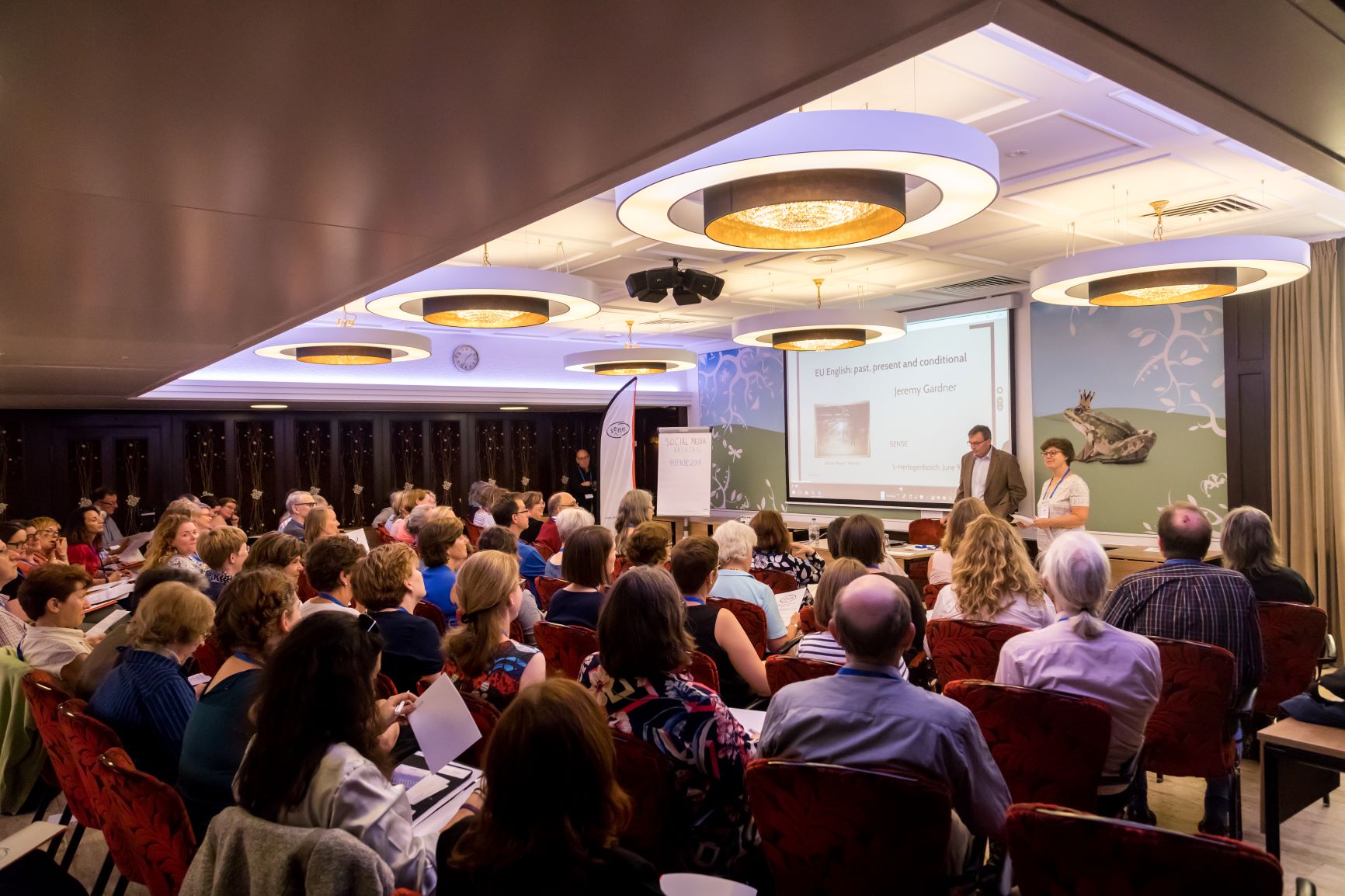
Photo by Michael Hartwigsen
There is no shortage of conference accommodation in the Netherlands, so choosing one just requires a map of the country and a pin, right? Wrong, especially if it’s for the SENSE biennial conference…
Two years ago, I was asked to recommend a location for the 2018 conference. It was quite a challenge, but eventually the decision went in favour of ’s-Hertogenbosch – not because it was a city nobody could spell, but because it offered the right combination of facilities that discerning SENSE members expected.
So what is the ideal location for our conference? In short, there isn’t one, as everyone has his or her preferences. Some of us want a city location with good public transport connections, others want a monastery in the middle of nowhere with free parking, no distractions, and waking up to bird song. As we are becoming a more international event, simply choosing a place that is accessible by train, bus or bike is not enough.
Starting last January (yes, January 2019!), I longlisted almost fifty locations that, in my experience with other conferences, would be suitable. These included several locations suggested by other SENSE members. I shortlisted this to twelve. Of those twelve, five did not have availability, offered a ridiculously high rate or simply failed to respond. Finally it came down to a straight contest: Rotterdam or Maastricht. My personal recommendation was for Maastricht, partly because they had come in second place in 2018, and were very, very keen to have us this time.
During the summer, several of the conference committee members visited the location, viewed the facilities and spoke to the staff. In the end, Maastricht won, but as a consolation prize Rotterdam got the Eurovision Song Contest!
Price is not the only issue, though of course this is a major consideration. Flexibility is most important. I had to explain to all the potential locations that if I was organizing a conference for a major national/international/multinational company, I could tell them immediately how much accommodation we would need, safe in the knowledge that the organizers would pick up the tab. It’s quite unusual for conference locations to understand that we are all freelancers, we pay our own expenses, and because the event is not during ‘office time’ (in other words, in our own time), SENSE cannot guarantee attendance numbers a year in advance.
Another important consideration was that the location should not charge more for two half days than they would for one full day. That’s a bit of a cheek, as it’s unlikely that they would be able to sell the conference facilities on the Saturday morning or Sunday afternoon, so in true Dutch tradition, it’s a case of ‘twee halen, één betalen’!* My shortlist was limited to locations that were prepared to meet us on this point, and most of them were.
I hope I have found the right location for the 2020 conference. If I have, you may congratulate me in June; if not, it’s the committee’s fault! The planning of the speakers, the programme, the workshops and the other activities is going ahead at full steam. My job is complete, but I’m already looking discretely at locations for 2022 – just in case the committee asks me again!
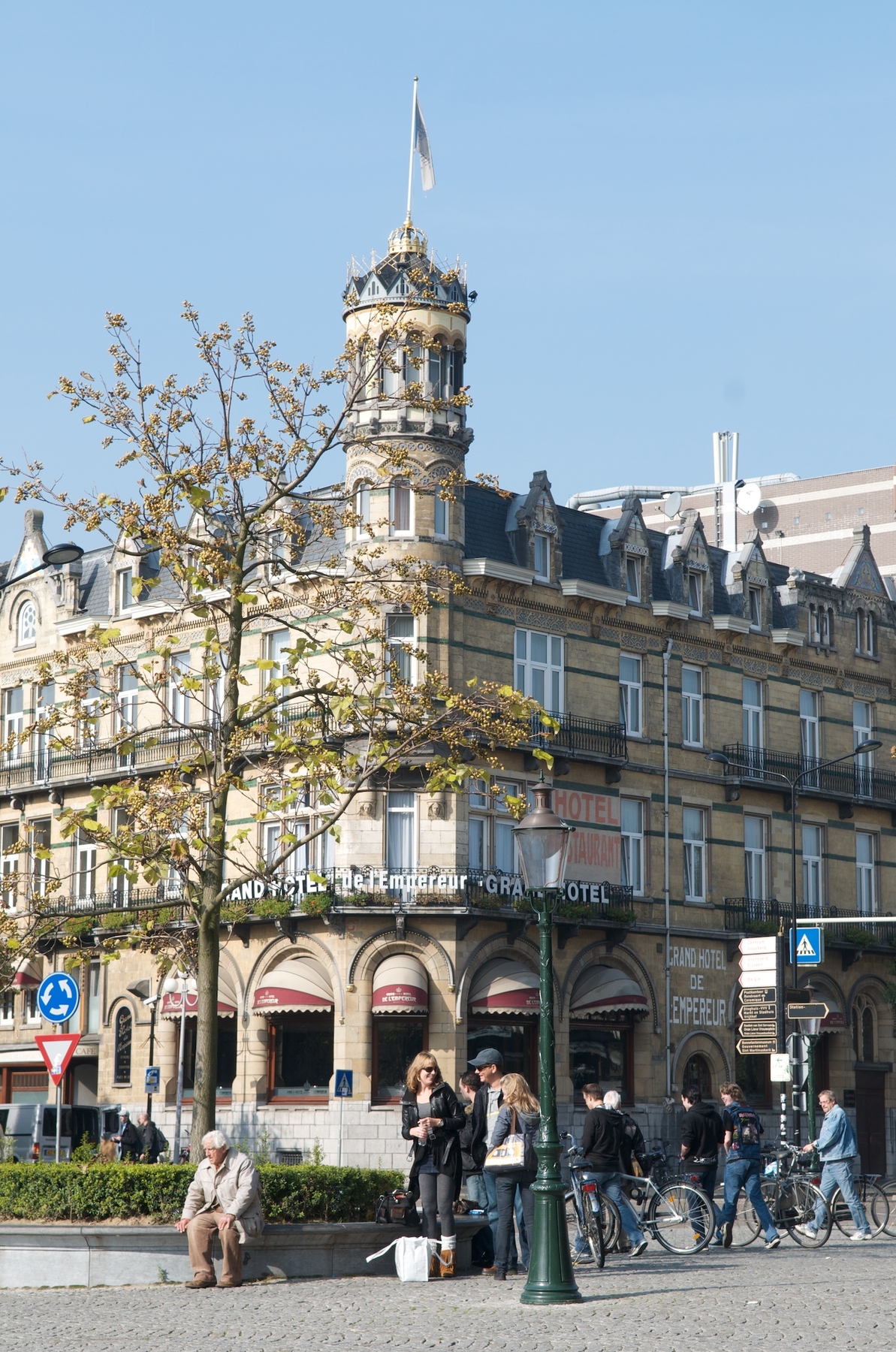
This is where we well be holding the pre-conference workshops and the conference itself: at the four star Amrâth Grand Hotel de l'Empereur in Maastricht. Conference delegates will be able to book a room at the special conference rate once registration for the conference itself opens.
For more information about the conference hotel, see the hotel's website.
Check this page for full details of the conference, location and programme!
© Image by Maastricht Marketing/Jonathan Vos. All rights reserved.
* for non-Dutch speakers, this is the equivalent of ‘Buy one, get one free’.
28 March 2020: SENSE Annual General Meeting at Kargadoor Utrecht
Written by Dave Thomas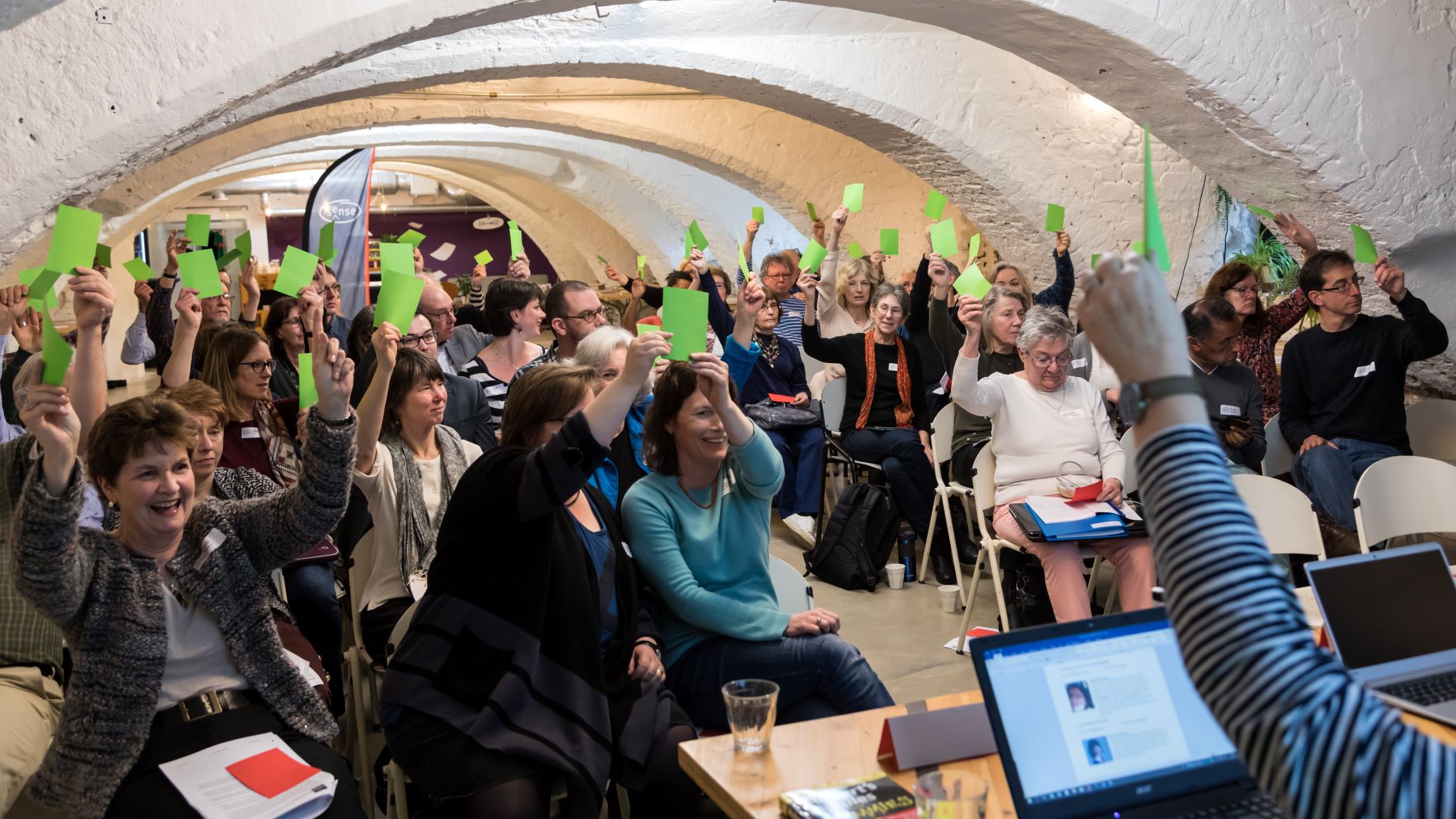
Photo by Michael Hartwigsen
Taking SENSE and making SENSE
We’ve just started a new decade, and SENSE has entered its third decade as a society. So, the time is ripe to broaden the Annual General Meeting's scope and to take it to a new level.
So, what’s on the menu? We’ll start by reviewing the society’s business over the past year: the 'taking SENSE' part. SENSE AGMs have previously been all-afternoon events. Now, in keeping with many other societies, the business part of the meeting will be much shorter (max. 1 hour) with a request to members to submit any questions in writing in advance. A shorter AGM does not mean compromising on our high standards of accountability and scrutiny, but just that the business will be conducted faster and more efficiently.
Now, of course, you’re wondering what will happen with the rest of the time. Well, we’ll use some of it to take a broader look at the society and what we can expect in the coming year: the ‘making SENSE’ part. This will also include an appropriate reflection on our thirtieth anniversary. Then we’ll take a leap into the wider world of language professionals by treating you to a talk by Claire King. She will be providing the English voice-overs for the Eurovision Song Contest later this year in Rotterdam.
Fortunately, some things are too good to change. Therefore, the afternoon will be rounded off with drinks and nibbles, giving you plenty of time to relax and chat with fellow members.
You can read the provisional timetable for the afternoon below, but first a word about this year’s location. We have chosen to host the AGM at Kargadoor, a cultural podium in the heart of Utrecht. By renting the facilities at Kargadoor, SENSE is supporting the highly diverse programme of cultural events offered there. We have the large room on the ground floor, which includes plenty of space for the traditional pre-AGM book swap.
Provisional timetable
13:45 doors open – book swap and tea & coffee available
14:15 AGM business part (taking SENSE)
15:15 AGM looking ahead (making SENSE)
15:35 AGM tokens of appreciation for SENSE volunteers
15:40 Tea and coffee break
16:00 30 years of SENSE
16:20 Talk by Claire King
16:50 Members’ questions to Claire King
17:00 Wrap-up, followed by drinks and nibbles
Please note that the AGM is open to all SENSE members and the programme is free of charge.
The SENSE EC looks forward to welcoming you all at this year’s AGM. Further information about the business part of the AGM and the rest of the afternoon will be sent to members in the coming weeks.
Dave Thomas
SIG and Social Events Coordinator
Academic writing with UniSIG and Ed SIG
Written by Marianne Orchard and Jackie SeniorIn early December 2019, both the Ed SIG and UniSIG focused on academic writing. Below, Marianne Orchard reports back from the UniSIG presentation on editing texts for the humanities and social sciences. Jackie Senior tells us how the SENSE Ed SIG members discussed the use of online resources for academic writing.
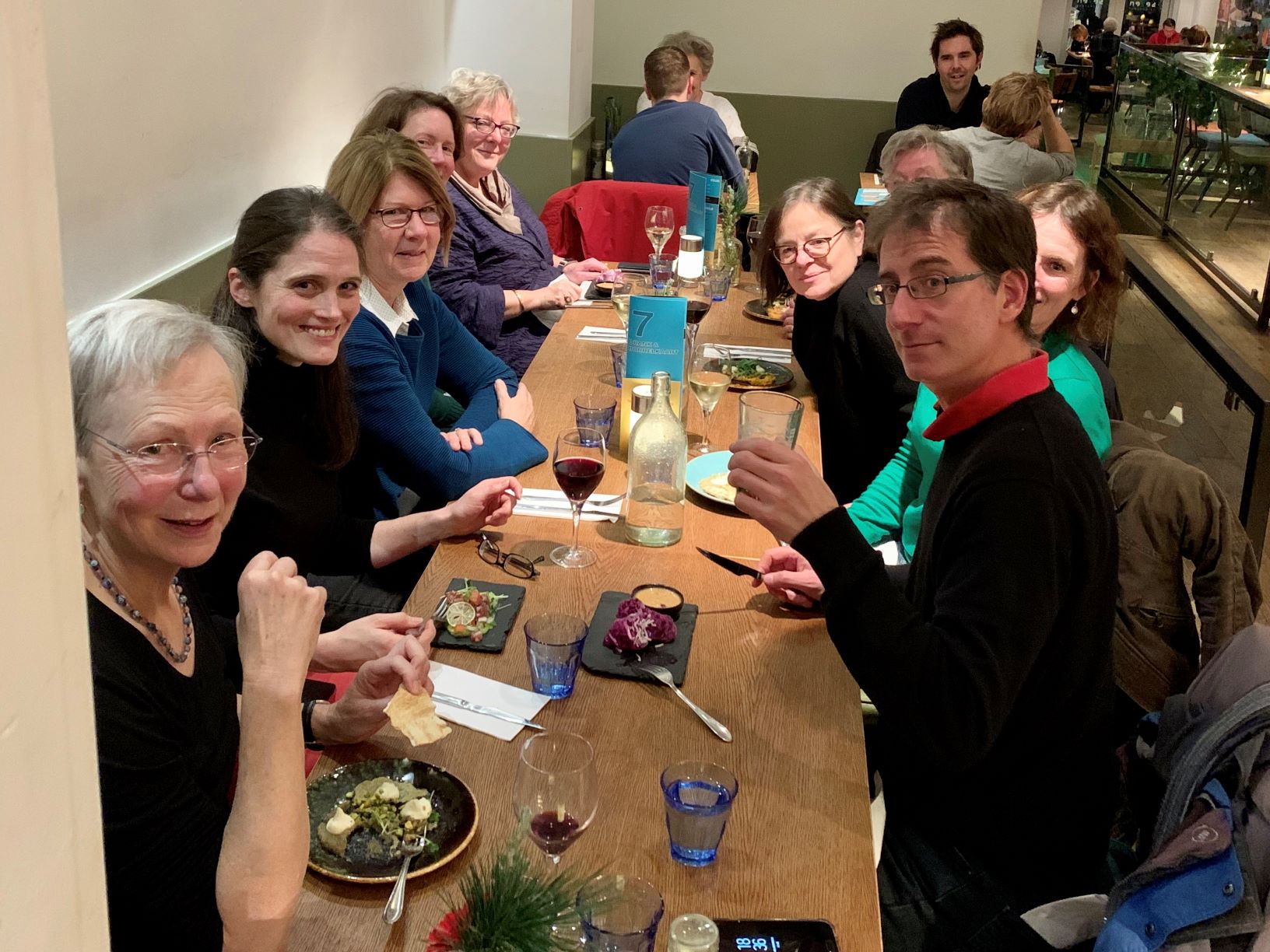
Photo by Theresa Truax-Gischler
UniSIG: Editing humanities and social science texts: theory and practice (Marianne Orchard)
Fourteen of us turned up for the UniSIG meeting at Se7en in Utrecht on Friday 13 December – as if we’d thought the venue would only accept multiples of seven. We’d come for a presentation by Theresa Truax-Gischler and Maria Sherwood-Smith on the American Council of Learned Societies’ Guidelines for the Translation of Social Science Texts.
The guidelines, Theresa explained, were developed to help those who commission edits and translations. ‘Given the potential of the social sciences to influence … millions of lives’, they declare, ‘it is incumbent upon both translator and editor to produce the most reliable translation possible.’
But what is a reliable translation or edit? Should you domesticate or foreignize? Maria had faced this conundrum when translating a Dutch book on 19th-century correspondence. In a more cerebral version of Snog Marry Avoid? she had had to decide whether to translate, gloss or borrow archaic forms of address such as uedele, wel edele and gij.
And given the importance of storytelling and voice in the social sciences, should you level stylistic peculiarities or allow a note of foreignness to enter the text? And what about errors in the source text? Translators and editors, say the guidelines, ‘…must not attempt to correct what they perceive to be errors in the text.’
We decided it boils down to whether you privilege the source text, as the guidelines prescribe, or the target text. However, as many of us have a direct relationship with the author, perhaps we are like quantum particles and can exist in two states at once: as both author’s and reader’s editor/translator.
Photo by David Barick
SENSE Ed: Online Resources for Academic Writing (Jackie Senior)
First, David Barick reported briefly on the EU-MIRoR conference (Methods in Research on Research) that he’d attended in Paris. This project aims to reduce wasteful clinical research and increase the value of research practice. Then we moved on to the main subject of the afternoon: discussing the numerous online resources for learning about writing in English and about academic writing. Such resources need to be chosen carefully to match the learners’ individual needs and the course being given: no easy task given the number of websites available. It is essential to first specify who will be using the resource, at what level, and for what purpose.
David provided a list of resources and we looked at some together. These included the Springer, Purdue University, Columbia University and CARS model websites. As these are generally large, text-based websites, selecting what to look at was sometimes rather difficult. We had a lively discussion on some of the advice given (so many language professionals, so many opinions) and then we did some of the online tests offered to students for them to check what they had learnt. However, we found we sometimes needed more than one go to work out what the correct answer was. This highlights one of the difficulties for students using websites on their own: there’s not always an explanation of what they’ve done ‘wrong’. A face-to-face teacher can point students in the right direction.
We found each website missed some points we would have expected to be covered, for example, the use of the passive, nominalization, writing for a specific field, or relating the instruction to the student’s native language and to their concept of formal writing. We then looked at the AWL (academic word list) Highlighter. This tool highlights the formal words used in academic texts and gives the writer an idea of how much they are using the correct sort of vocabulary. It also offers help on meaning and pronunciation.
For the second half of the afternoon, we looked at videos that explained aspects of academic writing. Some of these were less than inspiring and consisted only of a person talking to the camera, while others (e.g. a TED talk on How to use semicolons) used visuals to attract attention and explain more complex points. Several videos were rather simple and proved a slow way of gathering information (since many people can read a text more quickly than listening to a speaker).
In the end, recommending one website over another proved rather difficult. We finished on a lighter note with the suggestion that all writers and students should watch Helen Sword’s YouTube video on Zombie Nouns, and follow her advice on writing vigorous, verb-driven sentences.
Please consult the SENSE Members’ Forum to see a complete list of resources used during the SENSE Ed SIG meeting.
Celebrating 5 years of NEaT
Written by John Linnegar & Theresa Truax-Gischler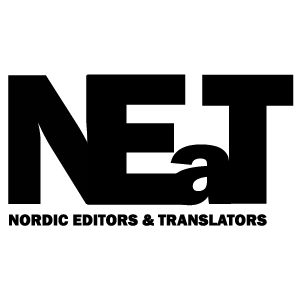
A little bird has tweeted that Nordic Editors and Translators (NEaT) has recently celebrated their 5th jubilee … cause for a resounding kippis! ('cheers!' in Finnish) to our sister society, if ever there were.
To hear NEaT tell it, everything began on a cold mid-January day of 2014 in the hazy back room of a small Helsinki pub, the Leijuva Lahna. It was there that the mission, the name, and the founding members, some twenty in all, came together to create a professional network of editors, translators, and language professionals. Julie Uusinarkaus was to act as chair that first year, Daryl Taylor did the legal documentation and paperwork, and Virve Juhola translated everything into Finnish. On 20 October 2014, the Nordic Editors and Translators association became registered as a professional organization in the Finnish Register of Associations.
Of course, all founding fables have a back story, and NEaT’s began at the Mediterranean Editors and Translators Meeting 2011. Four revisors from the University of Helsinki – Julie Uusinarkaus, Lisa Muszynski, John Gage, and Stephen Stalter – met with MET members Mary Ellen Kerans, Marije de Jager and Alan Lounds to ask them about how to create an editors’ association in Finland and the other Nordic countries. Back in Helsinki, the team began collecting the names of local editors who might be interested in launching an organization. In 2012, Lisa and Julie began their first editing seminars at the university. When Virve joined the effort, translation was added into the organizational mix. By the end of 2013, just in time for a mid-winter’s founding, the list of potential members of what was soon to become an association of editors and translators had built to around 100 professionals. A star was born.
Over the years, NEaT has held a number of events, and under the watchful eye of the likes of stalwarts Julie, Lisa, Virve and Ian Mac Eochagáin they just keep getting better. In September 2014, NEaT partnered with KAJ (since 2019: Kieliasiantuntijat), the Finnish trade union for language specialists, and SKTL, the Finnish Association of Translators and Interpreters, to present a seminar on noun stacking by lecturer Stephen Stalter. The following year, an annual NEaT event, English Today, was introduced together with new partner the Finnish-British Society (Finn-Brit), and a panel discussion on Demanding Quality was organized. The year 2015 also saw NEaT’s first Annual General Meeting take place and witnessed the inauguration of the NEaT newsletter and website, www.nordicedit.fi. In the ensuing years, workshops, seminars, lectures, roundtables, panels, social events and topic-oriented committees followed.
Open to non-members, NEaT’s unique English Today seminar series now attracts language professionals from far and wide, taking as it does a deeper look at ‘what editors and translators working in and out of English have to keep in mind as they go about their work’. Clearly, ensuring that the quality of the English in translations and revised or edited documents is in conformance with international usage was, and remains, one of the society’s primary goals. Stop Press: English Today VI is scheduled for 13 March 2020, so mark your calendars and get ready for the trip north to Helsinki!
Reflecting a need to be a part of a community of practice, partnering has been a key strategy for NEaT’s growth and success – both locally with Finnish language organizations such as Kieliasiantuntijat, SKTL, and Finn-Brit, and internationally with MET, EASE and SENSE – something immediate past chair Virve Juhola worked hard to achieve. With the election of new chair Ian Mac Eochagáin in 2019, the focus has turned to strengthening and broadening the already-extant relationships with language professionals in other Nordic countries through the Norwegian Non-Fiction Writers and Translators Association (NFFO) and the Norwegian Association of Professional Translators (NORFAG).
Thanks to the close ties our respective societies have developed, ties SENSE treasures, a number of our members now also belong to NEaT. Some have attended, and continue to speak fondly of, NEaT events such as the summer social, the year-end Christmas function, and English Today. Such binding, bonding and learning encounters will, we hope, benefit both societies, which together now constitute a much wider community of language practice. And whereas our members who have had the opportunity to attend MET conferences annually have been able to make the acquaintance of kindred professionals from Norway and Finland there, now SENSE’s own conferences have begun to attract speakers and delegates from the more northerly climes. NEaT members Kenneth Quek and Carol Norris filled out our SENSE 2018 conference programme with an introduction to Chinglish and NEaT, a colloquium on journal-acceptable manuscript style, and participation in an international panel on editing texts for doctoral theses/dissertations – contributing appreciably to the conference’s success.
What’s emerged is that our collective quest to improve the English used in the documents we translate, revise and edit will continue to draw us together, lead to our finding common ground, and perhaps even enable us to pass assignments one another’s way in the best interests of clients. Such exchanges and cross-pollination can only bode well for all our members. Long may that continue as NEaT goes from strength to strength as the newest member of our European community of professional bodies.
Our congratulations and best wishes go to our sister society up north!
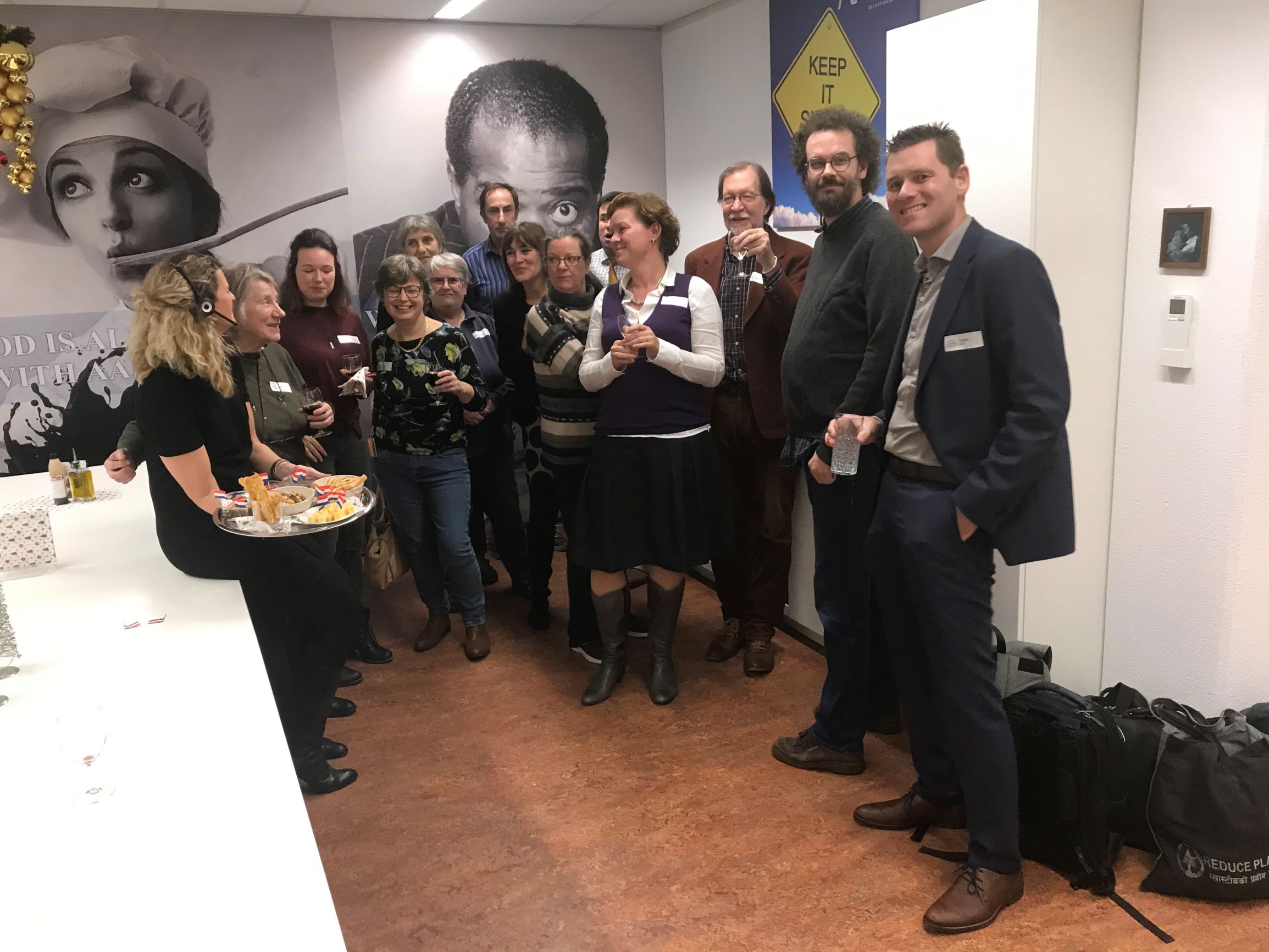
Photo by John Hynd
Whether it’s a blue envelope through the door or an email announcing Bericht van de Belastingdienst in uw Berichtenbox op MijnOverheid, either one is likely to fill you with dread at worst and irritation at best. So it’s no wonder so many SENSE members travelled to Delft on 10 December for the seminar Understanding Dutch tax for freelancers hosted by AAme Tax Consultants.
Tax advisor Quintin Eadie kicked off the proceedings with a comprehensive overview of the Dutch tax system. Among several subjects, he covered income tax procedures for filing returns, the benefits of having a fiscal partner such as a spouse or registered partner, and the different types of taxable income. He then went on to present proposed future changes to the Dutch tax system. These include a two-tier tax bracket system from 2021 onwards, the abolition of study costs as a deductible expense and the limitation of tax deductions to the lowest bracket. Of these changes, limiting tax deductions may have the biggest impact on freelancers. Although we will pay more tax in the long run, this may be offset by higher tax credits. This is by no means certain, however.
After a short coffee break, certified public ccountant Pauline Deelen-Aarts gave a presentation on BTW (Dutch VAT). She talked about the different categories of BTW – exempt, 0%, 9%, 21% – and where they apply. She also covered changes to the Kleine Ondernemersregeling and how to reclaim BTW paid on a bad debtor. Most importantly, Pauline highlighted the new BTW numbers coming into effect in 2020. Your new BTW number must be stated on your invoices and website (if applicable), but your old BTW number must be used in your BTW returns and any correspondence with the Dutch Tax Office. Nothing is simple when it comes to Dutch taxes!
During the BTW presentation, Jenny Zonneveld raised a question on behalf of SENSE members who have been approached by Scribbr, an online editing service for students. Besides paying low rates, Scribbr does not charge BTW, since it describes its services as ‘remedial teaching’ and therefore BTW-exempt. As this assertion is new to many SENSE members, we asked Pauline’s opinion. AAme will get back to us in due course.
Ronald van Leeuwen, certified public accountant, finished off the seminar with a presentation on fiscal benefits and various tips and tricks. He emphasized the importance of good administration and careful record keeping, including a daily record of hours spent on work and business activities. He also covered use of a company or private car and the SME profit relief, both of which are relevant to freelancers.
Like other attendees, much of the information presented was familiar to me, but it was good to be reminded on some points and have my mind put at rest on others. And as always, it was great to get together with other SENSE members and hear their tax experiences.
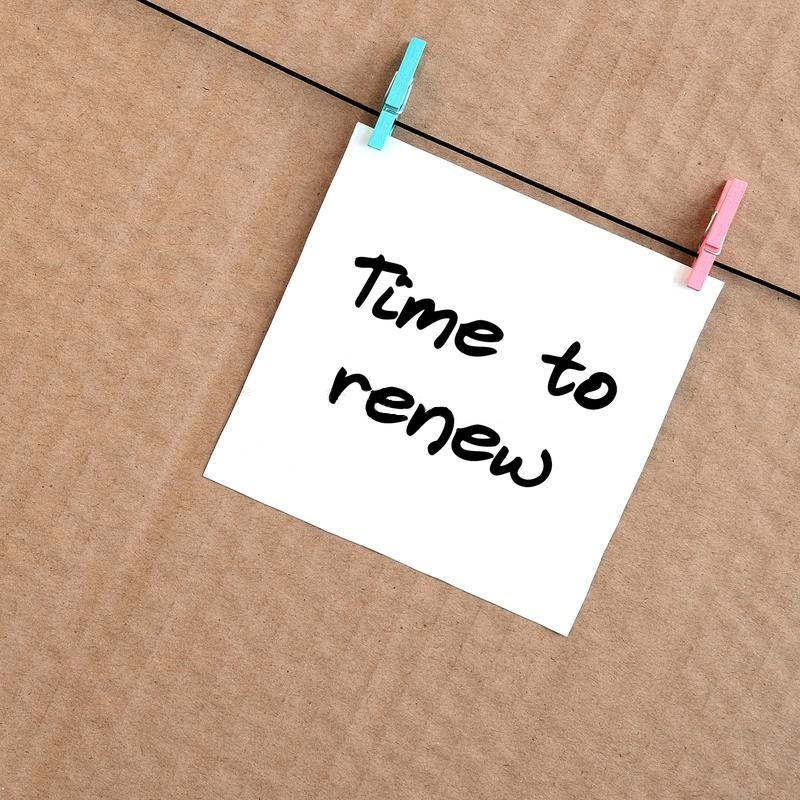
Yet another year has flown by and I am now in the midst of inviting members of SENSE to renew their membership for 2020. The first invitation went out on 2 December and, I am happy to say, more than 100 of you have paid up so far! Inevitably, there are always members who wish to cancel their membership – perhaps due to retirement or simply not having the time to participate in SENSE activities – but fortunately we have also been able to welcome some new members in recent months.
For anyone who may be thinking about joining SENSE, now is the time to do it! Our memberships run from January through to December, so if you join now you’ll be able to take full advantage of all the benefits SENSE membership has to offer. For example, we organize a number of workshops throughout the year, giving you the opportunity to hone your professional skills. There are also plenty of social events where you can practise your networking skills. The highlight of 2020 will be our Jubilee Conference to be held in Maastricht on 6-7 June. The theme of the conference is (Re)Vision: Honing our Skills to Meet Market Challenges. Registration will open shortly.
We also offer a members-only Handbook with a wealth of best-practice information for new and more seasoned language professionals, and Special Interest Groups where you can meet members in your geographical area or your specialist field. If you are interested, please see our Join page!
Current members, please remember to renew your membership by 31 January 2020! I will be sending a few reminders throughout January.
It only remains for me to wish everyone happy holidays, and I look forward to welcoming both old and new members to SENSE in 2020.
Best wishes,
Claire Koers
SENSE Membership Secretary
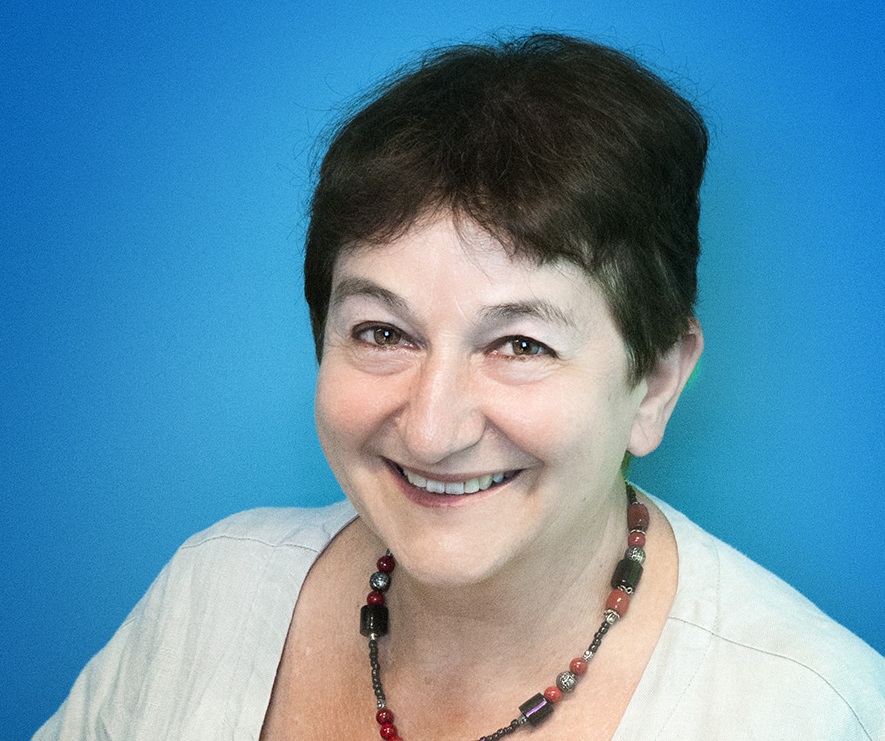
Ros Schwartz is an English literary translator who translates Francophone writers. In 2009, the French government awarded her the Chevalier d’Honneur dans l’Ordre des Arts et des Lettres for her services to French literature, and in 2017 she was awarded ITI’s John Sykes Memorial Prize for Excellence. She's coming to the Netherlands to give a workshop on 11 January 2020 and by way of a warm-up, we asked her six questions.
SENSE members usually work with clients (translating, editing and writing for their readers and clients) who are not native-English speakers. That often means avoiding idioms (both American and British) and keeping the writing simple and straightforward. How can they do that and still make it interesting, powerful and vivid?
That’s what we’re going to be addressing in my workshop! Simple doesn’t necessarily mean dumbing down. It means writing clearly and avoiding overly abstract language and convoluted sentence structures. The main thing when working with non-native English speakers is to build credibility and trust. Once clients are confident that you know what you’re doing, they’ll allow you the freedom to adapt your translations to the target culture.
Let me give you an example: I had a French client who regularly sent me press releases for the trade fair industry. French press releases are written in a completely different way from English ones: they start with a lot of general waffle, with the key information right at the end! I knew that if I simply translated the French, the result would not be fit for purpose and would end up in the bin before the reader even got to the main point. So how to convince the client? I translated one press release as it was, and then I wrote an English press release. It was half the length, punchier and had the essential information at the beginning. I presented both versions to the client, who immediately saw that my adapted version was much better suited to the English readership. After that, they would ask me to write a press release based on the French. We agreed an hourly rate that reflected my added value input. Outcome: a translation that was fit for purpose, and increased satisfaction all round. It is worth investing the time and effort in client education. These conversations should happen face-to-face when possible and you need to articulate your understanding of the differences between the source and target cultures in an authoritative way.
What other pitfalls do you think SENSE members should be especially aware of when writing for non-native readers?
Always ask to check the proofs and make it clear you consider that as part of the job. Non-native speaker clients will sometimes ‘correct’ the English without consulting you and typesetting programs sometimes introduce wrong punctuation (e.g. inverted commas, hyphenation). It’s important to acquaint yourself with the terminology or jargon the reader is familiar with, so ask the client for reference material (i.e. glossaries, previous translations) and read industry publications.
How can translators be better writers and still stay true to the original text? After all, they may have little leeway to rewrite the material they are given, or even to stray too far from the source. What advice can you give them?
It depends what you mean by ‘stay true to the original text’. You can remain true to the spirit but stray from the letter. Translation is first and foremost about communication, and it’s our job to communicate in the most effective way possible. Some source texts are poorly written, but that’s not an excuse for producing a poor translation. We shouldn’t lose sight of the overall purpose, which is to convey information or ideas. Again, we need to build client trust and convince them that we know how best to convey their message. This applies especially to fields such as tourism and art. Ultimately, we must have the confidence to see ourselves as competent writers, not humble servants of the source text.
Many clients do not share their ‘reader persona’ – if they even have one – with their translators or writers. When one is working on business texts, what should one do to convince the client to see things from the end-user’s perspective?
One thing you can do is refer to industry literature written in English. I’m thinking of the research into annual reports carried out by David Jemielity of Banque Cantonale Vaudoise. European companies often refer to themselves in the third person, whereas English companies use the first-person ‘we’. David’s superiors were very resistant to the idea of saying ‘we’, so he analysed annual reports written in English, which chiefly used the first person to talk about the company, versus translated annual reports, which slavishly used the third-person of the source text. Armed with these findings, he convinced BCV to switch to ‘we’.
What advice can you give to SENSE members who want to position themselves at the quality end of the translation market?
Work with direct clients so you can have the sort of conversations I’ve mentioned. And talk to them about the translation process to encourage them to build in the time you need to do a top-quality job. Most clients have no idea how long translation takes, so we need to be more transparent. As part of a client education talk I gave to a group of trade fair organizers, I held up a text of around 400 words and asked them how long they thought it would take to translate something of that length. They had no idea, hence the deluge of ‘urgent’ translations with impossible deadlines. So now, when I am asked to provide my rate, I include a planning guide, suggesting the time needed to translate texts ranging from 500 to 10,000 words.
If you’re charging premium rates, it’s also important to spell out what ‘quality’ means and what clients are getting for their bucks. It is always beneficial to have two pairs of eyes on a translation, especially when it’s intended for publication, so break down the quote into the different stages: research, compiling a glossary, creating a style sheet, translation, checking, copy-editing by an external professional, responding to client/author feedback and proofreading. And give an estimate of the amount of time involved. Often there’s a disconnect between the language we speak (price per 1,000 words/per page etc.) and that of the client. They’re interested in the overall price, and whether it comes within their budget. But if you want to stand out from cut-price competitors, you need to demonstrate what it is you’re offering that justifies your higher rate. Once the task is broken down into the different stages and days’ work rather than a price per word (which demeans what we do – we’re not just substituting words), the price makes more sense to the client.
Which three things do you hope SENSE members will take away from your workshop?
- Confidence in themselves as writers
- Concrete writing tips
- Contacts for future collaboration
Further reading:
- https://le-mot-juste-en-anglais.typepad.com/le_mot_juste_en_anglais/2012/09/ros-schwartz-traductrice-du-mois-de-septembre.html
- https://www.ata-chronicle.org/featured/how-long-will-it-take-you-to-type-this-in-english/#sthash.LCkkg3ew.LRknEDOT.dpbs
- https://bookblast.com/blog/interview-ros-schwartz-translator-week/
- https://www.englishpen.org/translation/translation-tips/
- https://www.youtube.com/watch?v=H9OxptvPFxc
- https://www.wordsandpics.org/2019/03/translation-ros-schwartz.html
- https://intralingo.com/spotlight-on-literary-translator-ros-schwarz/
- http://authors-translators.blogspot.com/2015/03/ros-schwartz-and-her-authors.html
- https://www.cleavermagazine.com/rachel-r-taube-interviews-ros-schwartz-translator-of-translation-as-tranhumance/

John Linnegar answers a question that often arises in the mind of the new entrant to the world of editing: Which reference works should I have at my disposal if I’m to edit professionally?
To be truly professional – and well organized and consistent – you should first consult the client’s house style for their preferences; then ascertain which dictionary (and which English, UK or US) they are wedded to. Then develop a sensitivity to particular disciplines’ preferences for spellings, capitalization/lowercase, hyphenation or not, use of italics, and so on. Once you’ve taken cognizance of these non-negotiables, it’s up to you to impose correctness and consistency on the documents your intervention will improve. Any edition of the publications listed below will be invaluable aids, but if you can obtain – and afford – the latest, they tend to reflect current trends and wisdom, and now also the most up-to-date technologies. The ‘starter kit’ is a fairly basic, but nevertheless an essential one. Begin with a mid-range dictionary for the language in which you typically edit. In English, you could choose between:
- Collins English Dictionary
- Concise Oxford Dictionary
- Cambridge English Dictionary
- Any of the Advanced Learner’s or Cobuild dictionaries
Word lists
Some word lists are available online, some free of charge (eg the Oxford Dictionary); others are available on CD for easy electronic access (eg Concise Oxford English Dictionary on CD-ROM; Collins English Dictionary on CD-ROM). Then, in addition, you’ll want to have access to word lists that help writers and editors specifically (they’re filled with the kind of quirky words that only we wordsmiths fuss over):
- Bryson’s Dictionary of Troublesome Words: A Writer’s Guide to Getting it Right (Broadway Books 2004)
- Martin H Manser Collins Dictionary for Writers and Editors (Collins 2006)
- New Oxford Dictionary for Writers and Editors (2014 or earlier)
Subject-specific references
For the internationally recognized conventions that apply in a variety of disciplines, you’ll be well advised to consult references such as:
- New Hart’s Rules: The Handbook of Style for Writers and Editors (2014 or earlier)
- The New Oxford Dictionary for Science Writers and Editors is but one of a range of many mini-dictionaries dedicated to specific subject areas
- Penguin has also published a range of specialist dictionaries (eg Electronics, Geography, History, Physics, Psychology) that are really worth investing in
- The latest edition of Oxford’s Concise Colour Medical Dictionary (5 ed 2010, with links) is a gem of a reference for wordsmiths working in this field
Style guides
To ensure consistency of spelling, punctuation, hyphenation, the use of numbers, and so on, there are a number of style guides to consider:
- Australian Style Manual for Authors, Editors and Printers (6 revised ed, Wiley, 2011)
- The Chicago Manual of Style
- Joseph Gibaldi MLA Handbook for Writers of Research Papers (Modern Language Association 2003) (US)
- Cheryl Iverson AMA Manual of Style: A Guide for Authors and Editors (OUP 2007) (US)
- The Oxford Manual of Style
- William Strunk and EB White The Elements of Style
Words, words, words
Sometimes, a thesaurus comes to the rescue when we’re at a loss for words. The classic is Roget’s Thesaurus (published under various imprints), but there are also reverse dictionaries (Reader’s Digest, Oxford, for example) that are enormously helpful. A dictionary of quotations can often also be helpful, specifically to check that quotations the authors include in their manuscripts are in fact accurately reproduced and correctly attributed: Penguin and Oxford have both published general and modern collections of quotations.
Grammar gurus
If your grammar’s rusty or the 'rules' are simply a bugbear to you, then find yourself a useful book on grammar/punctuation that covers the basics, possibly more. Some examples:
- Joy Burrough-Boenisch Righting English That’s Gone Dutch (Kemper Conseil 2013)
- James Cochrane Between You and I: A Little Book of Bad English (Icon 2005)
- GV Carey Mind the Stop (Penguin 1980)
- Marion Field Improve your Punctuation and Grammar (howtobooks 2003)
- Fowler’s Modern English Usage (OUP, various editions)
- Garner's Modern English Usage (OUP 2016)
- Good Punctuation: The One-stop Punctuation Problem Solver (Collins 2004)
- Sir Ernest Gowers The Complete Plain Words (various editions)
- John Kahn (ed) The Right Word at the Right Time (Reader’s Digest 1985)
- Noah Lukeman The Art of Punctuation (OUP 2007)
- Elizabeth Manning Murphy Effective Writing: Plain English at Work (Lacuna 2014)
- Eric Partridge You Have a Point There: A Guide to Punctuation and its Allies (Hamish Hamilton)
- Eric Partridge Usage and Abusage (Hamish Hamilton)
- John Seely Oxford A to Z of Grammar and Punctuation (OUP 2013)
- RL Trask Penguin Guide to Punctuation (Penguin Reference 1997)
- HA Treble & GH Vallins An ABC of English Usage (Oxford/Clarendon Press 1936)
- Ben Yagoda When You Catch an Adjective, Kill It: The Parts of Speech, for Better and/or Worse (Broadway Books 2007)
Citations
For help with styling citations and reference lists or bibliographies, the following titles are useful guides:
- Marlene Burger Bibliographical Style and Reference Techniques (Unisa Press 2010)
- Joseph Gibaldi MLA Handbook for Writers of Research Papers (Modern Language Association 6 ed, 2003)
- Charles Lipson Cite Right (University of Chicago Press 2009)
Sage guidance on editing
Finally, for sage guidance on all matters editorial in general:
- Judith Butcher, Caroline Blake & Maureen Leach Butcher’s Copy Editing (Cambridge University Press 2007 – or any earlier edition of this classic)
- WAM Carstens & Kris Van de Poel Teksredaksie (SunMedia 2010)
- Gill Davies & Richard Balkwill The Professionals’ Guide to Publishing: A Practical Introduction to Working in the Publishing Industry (Kogan Page 2011)
- Amy Einsohn The Copy-editor’s Handbook (University of California Press 2000, 2005)
- Elizabeth Flann, Beryl Hill & Lan Wang The Australian Editing Handbook (John Wiley 3 ed, 2014 — or any earlier edition)
- Janet Mackenzie The Editor’s Companion (Cambridge University Press 2004)
- Janet Mackenzie (ed) At the Typeface: Selections from the Newsletter of the Victorian Society of Editors (Victorian Society of Editors 2005)
- Elizabeth Manning Murphy Working Words (Canberra Society of Editors 2011)
- Scott Norton Developmental Editing: A Handbook for Freelancers, Authors and Publishers (University of Chicago Press 2011)
- Carol Fisher Saller The Subversive Copy Editor: Advice from Chicago
- Kris Van de Poel, WAM Carstens & John Linnegar Text Editing: A Handbook for Students and Practitioners (UPA, 2012)
Of course, you do not have to stock your personal library with all of the tools of the trade included here – publishers’ and public libraries will usually have them available to consult as and when the need arises. You’ll be the best judge of those genres and titles you will most need to have as stalwart, regular aids – as investments in your professionalism those will be worth their weight in gold.
This article was originally published in eSense 41 (2016).
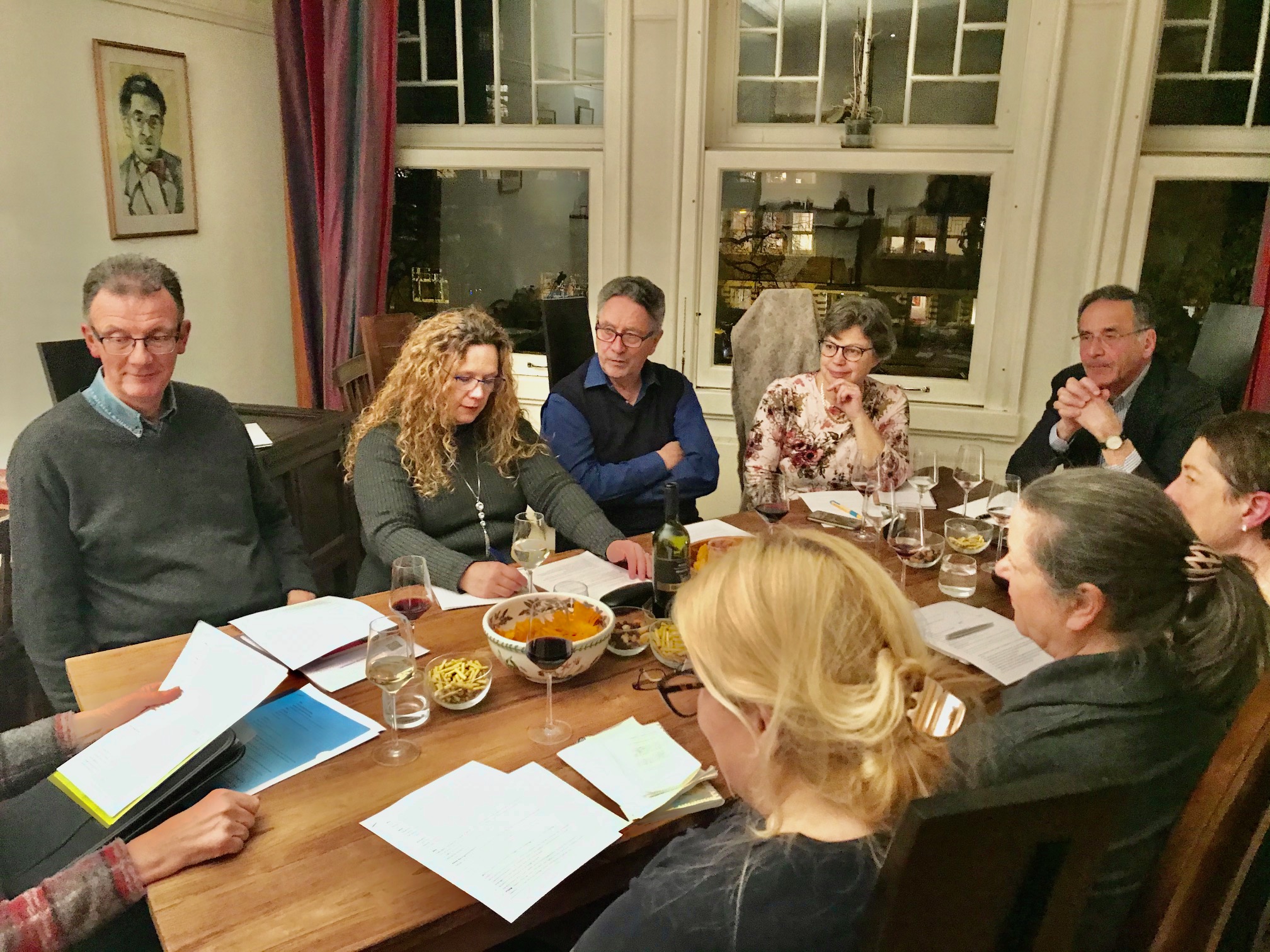 (Photo by John Hynd)
(Photo by John Hynd)
Nine of us gathered at John Alexander’s delightful Art Deco home in Amsterdam to discuss two barely comprehensible texts provided by Alison Gibbs and to learn from her extensive experience as an editor and translator.
While we munched on the nibbles and savoured the wines, Alison enthusiastically described her own types of work and clients, dispensed useful pieces of advice and outlined common pitfalls. One of her key suggestions (originally contributed by a wary/weary handyman) was to ‘know when to stop’. Other warnings included to avoid wasting time on grammatical blunders encountered during one’s everyday life: “There are more productive ways of channelling my nit-pickery than correcting greengrocers’ apostrophes.”
A dizzying array of practical and professional tips followed, including on how to assess jobs, clarify clients’ expectations, charge for one’s time, review editorial changes, use online tools and resources, and check for common errors.
While still attempting to digest this rich diet of advice, we gingerly bit into the two texts – and quickly stubbed our teeth. It was generally agreed that the almost impenetrable one about the Azores was worth steering clear of, while the taxation one was to be attempted only by the most intrepid souls (or those with serious insomnia). Alison’s own versions, however, read like an English-language dream – attesting to her dedication, finely-honed detective skills and feminine intuition.
We ended the evening much the wiser, not to mention a little the merrier. Hic!
